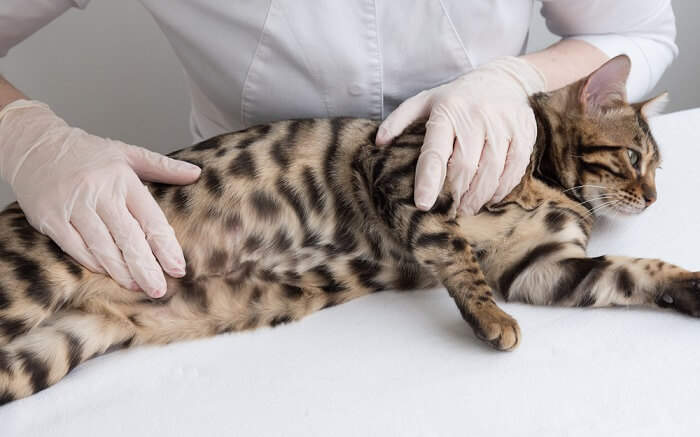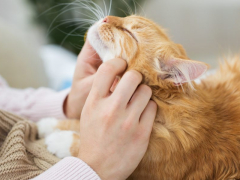Parasites come in many forms. Some we can see on our cats, such as fleas and ticks. Others are not readily visible to us as pet owners. Internal parasites such as heartworms, roundworms, hookworms, whipworms, and tapeworms all live inside your pet’s organs.
Roundworms are an example of a common intestinal parasite, meaning that they live in your cat’s intestines and affect the digestion and absorption of food. By detecting, treating, and preventing these parasites, your pet will be healthier, and we also protect our human family members from parasitic infections.
Quick Overview: Roundworm Infection in Cats
 Other Names: Ascariasis
Other Names: Ascariasis
 Common Symptoms: Diarrhea, vomiting, distended abdomen, poor growth, weight loss.
Common Symptoms: Diarrhea, vomiting, distended abdomen, poor growth, weight loss.
 Diagnosis: Roundworms eggs found in fecal sample, spaghetti noodle-like adult worms visible in stool.
Diagnosis: Roundworms eggs found in fecal sample, spaghetti noodle-like adult worms visible in stool.
 Requires Ongoing Medication: No
Requires Ongoing Medication: No
 Vaccine Available: No
Vaccine Available: No
 Treatment Options: A couple of deworming medications are available to remove roundworm infection from the body. Monthly preventive medications can prevent recurrence or transmission.
Treatment Options: A couple of deworming medications are available to remove roundworm infection from the body. Monthly preventive medications can prevent recurrence or transmission.
 Home Remedies: None
Home Remedies: None
What Is a Roundworm?
Roundworms belong to a group called nematodes, and are also known as ascarids. The roundworm species Toxocara cati and Toxascaris leonina infect cats, while dogs are infected by Toxocara canis. Members of the Toxocara family are zoonotic, which means they can infect humans. If a human is infected with these parasites, severe disease can occur.
Roundworms spread through the mother’s milk or through eggs passed in the feces. An infected queen, or mother cat, passes immature roundworms to her kittens when they nurse through transmammary migration.
This means that the roundworm larvae pass through mammary gland tissue to the milk supply and into the kitten. Roundworms eggs also pass in cat feces. Once in the contaminated environment, the eggs mature into infective larvae, which are then ingested by another animal, or host. The larvae make their way to the small intestine where they live and feed off of the host.
How Cats Get Roundworm Infections?
Roundworms most commonly infect young cats and cats that are immune compromised, such as pregnant or sick individuals. Adult cats that acquire an infestation with roundworms may clear the infection on their own, or may be asymptomatic.
Kittens get an infection either through nursing or by ingesting roundworm larvae. Most kittens have at least a mild roundworm infection, and can present with symptoms if a lot of roundworms are present.
A large or distended abdomen can indicate a parasitic infection. In heavy infections, symptoms include anemia, lethargy, and vomiting or diarrhea. Occasionally, the infection can be so bad that the worms block the intestines, requiring surgical intervention and advanced treatment.
Roundworm Infection Treatment

In order to treat roundworms in a cat, you’ll need to give them the appropriate deworming medication.
Anthelmintic, or deworming medications, will treat and eliminate a roundworm infection. The tricky part is that the medication may only eliminate the roundworms that have reached certain life stages of the roundworm life cycle.
Repeated deworming of kittens ensures that no intestinal parasites remain. A fecal parasite exam may also confirm the presence of roundworms and other intestinal parasites. Your veterinarian should check for worms several times as your kitten grows.
Deworming medications work best when prescribed and given according to your veterinarian’s recommendations. Correct dosing depends on species, age, weight, and overall health. Kittens benefit from deworming every 2 to 3 weeks, starting around 4 weeks of age, until determined to be parasite-free.
When clearing the worm infection, the roundworms may pass in your kitten’s feces, or may even show up in vomit.
While some deworming medication is available over the counter, your veterinarian can advise which one is safest for your cat. Common medications include pyrantel and fenbendazole. Some medications such as ivermectin can have toxic side effects if not dosed correctly.
Good news! Several of the common preventions for kittens include medication to treat and prevent roundworms and other parasites. Your veterinarian can help choose the best option for you and your feline friend. Preventions including ones with selamectin, moxidectin, and milbemycin may be good options for protecting your cat.
Limiting access to areas where other animals defecate will also reduce risk of infection. Stray pets and those without regular care tend to carry parasites more often.
Risk to Humans

Roundworms pose a risk to humans, especially in rural or impoverished areas with a large, less-healthy stray pet population.
Roundworms pose a risk for humans, especially for children in rural or impoverished areas. These areas tend to have a larger and less healthy stray pet population. In all cases, removing fecal material of small animals, is important.
Scoop the litter box daily, and block off children’s access to outside areas used by animals for defecating such as sandboxes. The infectious larvae of the roundworms live in fecal material where the eggs have hatched.
Handling contaminated soil, plants, or food can lead to larva ingestion and human infection. Hygiene, such as washing hands and clothing, reduces the risk of transmission.
Infection in humans is rare, but humans are not the typical host, so the infections appear due to the migrating larvae. Visceral larva migrans (VLM) and ocular larva migrans (OLM) both occur secondary to roundworm infection, and can be painful and life-threatening.
VLM causes symptoms such as stomach pain, vomiting, diarrhea, weight loss, fever, and even death. OLM can cause retinal and eye inflammation, often leading to blindness. Your doctor can address concerns you may have about this condition or risk.
The risk of these decreases with appropriate treatment guided by your veterinarian.
You Can Prevent Roundworms
Roundworms are a common, but potentially dangerous, intestinal parasites of cats. Most, if not all, kittens are infected. Detection through fecal testing and proper deworming result in eliminating these pesky nematodes.
We also want to get rid of roundworms to protect our human family members from potential infection. You and your veterinarian can treat and keep your cat healthy by working together and choosing the medications and preventative that fit your pet and their lifestyle.
Frequently Asked Questions
Are roundworms in cats contagious to humans?
Yes, roundworms can infect humans, often through contaminated soil. Humans are not the typical host, though, and can have much more severe conditions than pets, including blindness, pain, fever, stomach upset, and even death.
Are roundworms in cats contagious to dogs?
Toxascaris leonina can infect both dogs and cats, especially kittens and puppies. Regular fecal sample checks to look for roundworm eggs, even in adults, will help detect these parasites so that your veterinarian can prescribed proper treatment.
Can you see roundworms in cat poop?
Yes, often as the dead adult worms pass through the intestines, you will see long, white, noodle-like worms in the poop. In heavy infections, live ones may pass, too, which is a signal to take your pet for a check-up right away.
Can cats throw up roundworms?
Yes, in heavy infections, there can be so many worms, that some trigger vomiting. These adult roundworms usually look like long, white noodles, and are an indication to call your veterinarian for an appointment.








